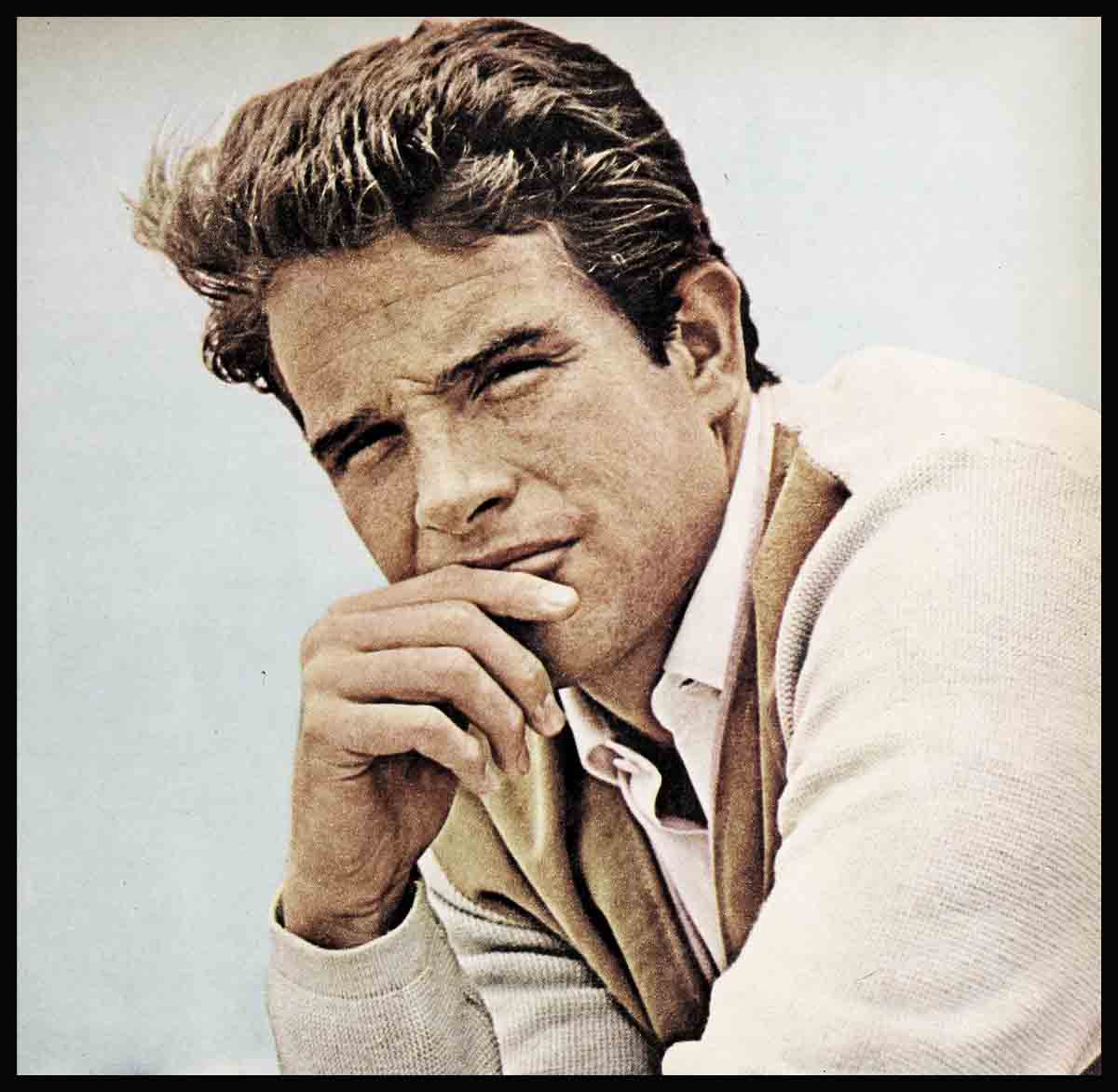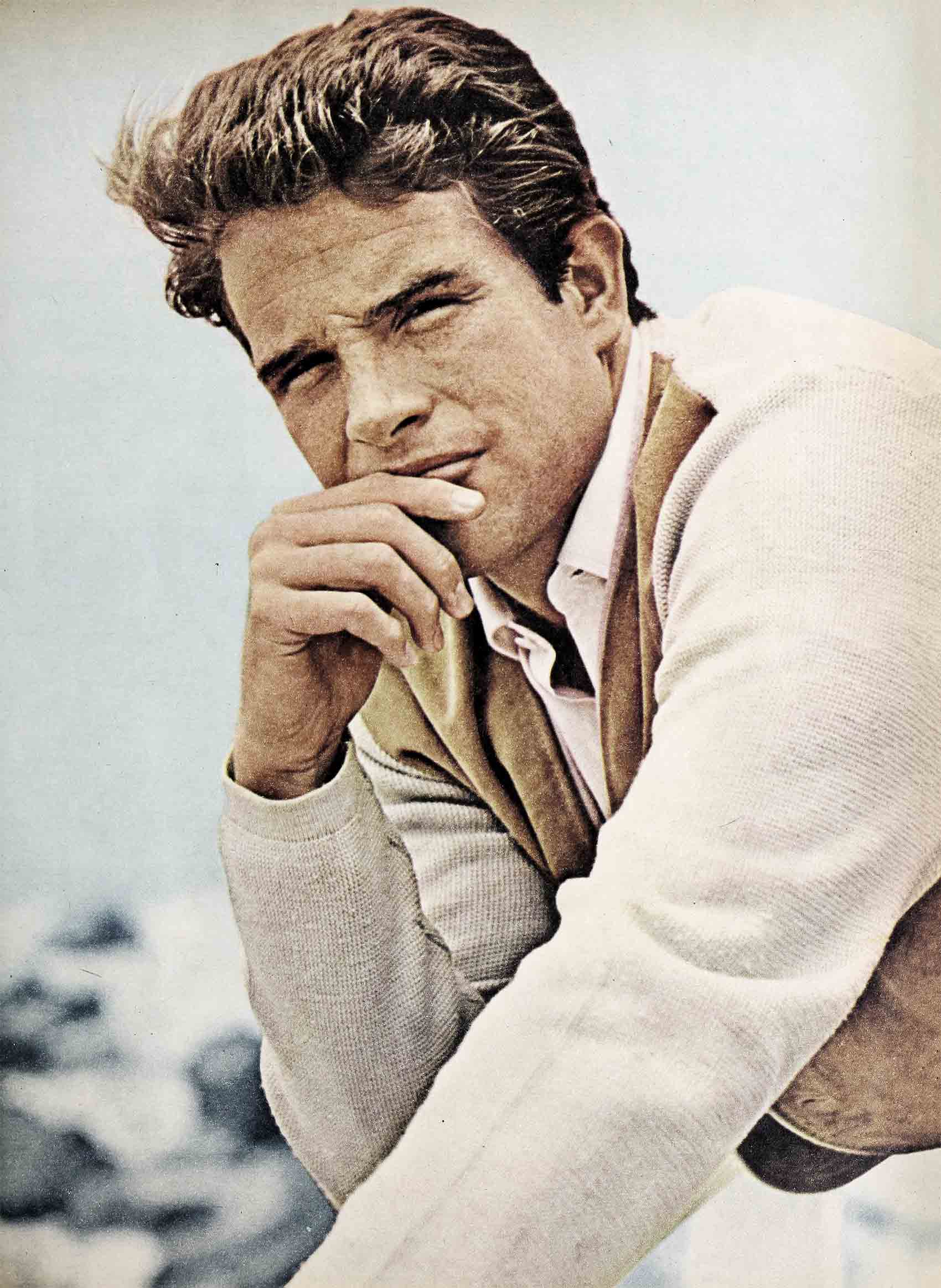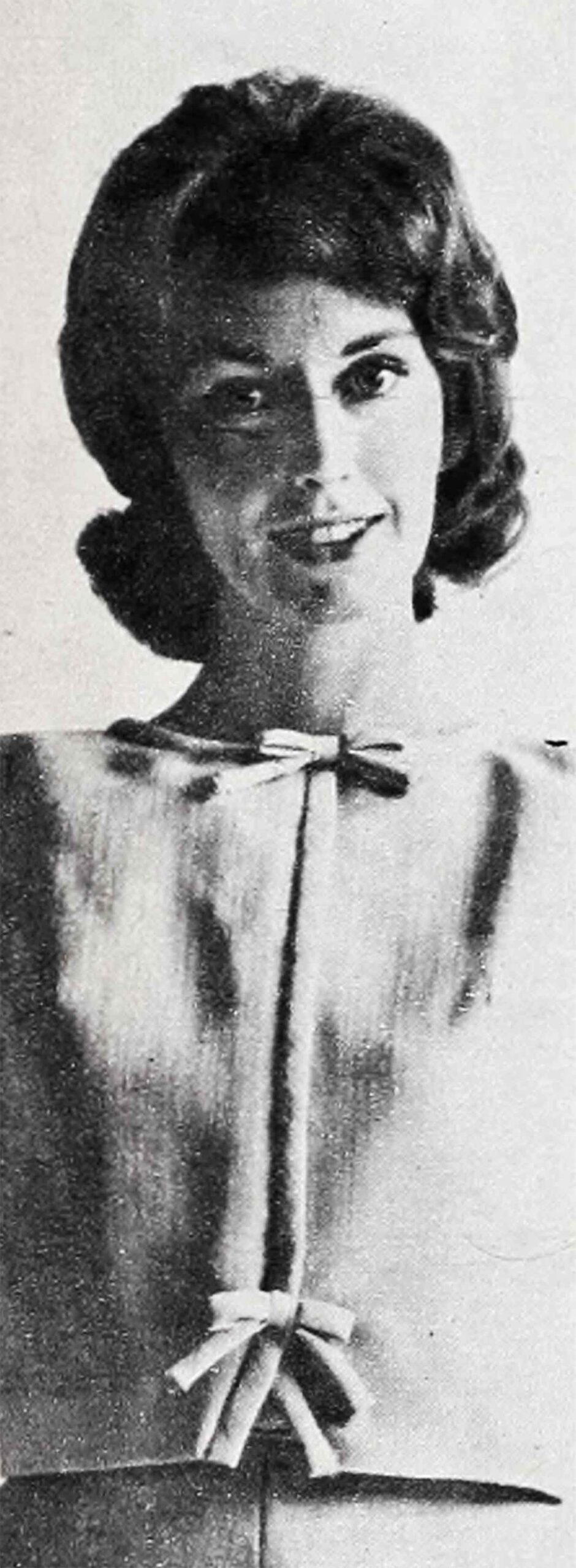
Warren Beatty, I Knew You When . . .
I will never forget the day Warren Beatty kissed me—kissed me, Debbie Sherwood!—right smack in front of everyone on the “Dobie Gillis” set. Oh, I was pleased all right, but I was embarrassed, too. The director was all ready to shoot a scene in the classroom. The assistant director had yelled, “lights” and we sat waiting for his “action” cue. But it didn’t come. One of the desks was empty. Warren was missing. Suddenly, his dressing-room door opened and Warren sauntered onto the set, down past the empty desk, right up to me. Then he leaned over and kissed me. Without comment, he walked back to his own desk and made a casual gesture to the director. It said, plain as words, “Okay—you can begin now.” Just like that!
Right here, I feel I ought to tell everybody that Warren and I weren’t really a romance, but we did become very good friends.
And Warren, I understand about that kiss! I know it was my reward for being your friend at a time when the rest of the cast sort of held back.
It’s true. Out of that whole usually friendly bunch, I was about the only one who’d tried to help the aloof newcomer. The others took Warren’s self-confident manner for conceit.
Well, you can’t hate a boy for kissing you. I liked Warren a lot. Now. when I hear him getting raked across the coals by the ones who say, “Oh Warren Beatty is out for Warren Beatty, he’s on the make for big success and he’ll make it any way he can,” I get hot on the defensive.
But I will admit one thing: Even then—you had to know Warren to like him.
The studio—Fox—had brought Warren from New York to Hollywood to play the role of Milton Armitage, Dobie’s rich and handsome rival for the affections of those pretty co-eds. At the time, Warren had no acting experience to speak of, but he was perfect for the part. He really was Milton—you know, tops in everything. Handsome, big wheel back in school, beautiful baritone voice, terrific at the piano. All Milton had that Warren didn’t have—then—was money.
“I’m going to be a star”
Warren knew the role inside out—and said so. I didn’t think that was such evidence of conceit. He was just absolutely sure of himself. Like when he told me I straight out, “Debbie, I’m going to be a star.” But I guess the others did take it as conceit.
And as I said, he was fairly aloof. Not shy—I really can’t say there was any shyness in Warren. It was just that when they all sat around gabbing—Dwayne and Bob Denver and the others—Warren talked mostly to me. And not so much in the crowd as in his dressing room. The only other person he talked to much was Rod Amateau, our director. Rod was a clown like Warren could be when he wanted, and they got along fine.
One thing nobody could claim, though—that Warren did any name-dropping about his famous sister, Shirley MacLaine. He never took any free rides to fame on her back. Any time her name came up, he’d play—to the hilt—the part of newcomer to Hollywood, and ask a lot of questions about this MacLaine dame. Sometimes he got pretty negative opinions from the unsuspecting victim.
Then I read somewhere that Shirley MacLaine and the considerably less famous Warren Beatty were sister and brother. I asked him about it, straight out. And he answered me straight out. He said, “Yes.” Nothing more, then or ever.
After a while Warren could only play the game on someone who hadn’t as yet heard of the family tie. Like William Schallert, a schoolteacher in “Dobie,” who got trapped into the “But what’s wrong with this Shirley MacLaine?” act. I don’t remember exactly which brickbats Schallert tossed—at one time or another innocent victims had been lured into calling Shirley “funny looking,” “loud in public,” “rude—at Dino’s she plays cards at the table right under the noses of the entertainers trying to do their acts,” “noisy and brassy,” “cold and calculating”—etc., etc., etc. Usually no one gave Warren away, but this day it got to the point where a stand-in felt he had to break it up. He whispered a certain fact into Schallert’s ear—who was so embarrassed that he walked off the set and never came on again if it meant working with Warren. Even Rod Amateau said, “Warren, you’re bad. You went too far.” And Warren, he was right—you really were a meanie to that poor man!
Fox had lent Warren a red convertible, and he’d often take me for rides in it or give me lifts home to the Studio Club where I lived—along with a lot of other ambitious but unmoneyed girls. Warren was staying at a very nice place, Chateau Marmont on Sunset Boulevard. (I think, since the studio brought him to the coast for the series, they put him up at the Marmont, just as they lent him the car.) But often he’d eat dinner with me at the Studio Club—paying his own way. The place was full of pretty girls and Warren liked girls—he was crazy about girls. But these girls, while they thought him cute, wouldn’t date him because he was a nobody. Hah!
Myself, I didn’t actually date Warren, but we did a lot of talking together, either in person or on the phone. If either of us was lonely we’d get on the phone for long, long stretches—usually late at night when we were both relaxed and could talk freely and honestly. And he did invite me, all that summer, to swim at the Marmont’s pool. Only I didn’t go.

I knew his faults
Oh, I liked him—but even then I had a feeling that if I let myself like Warren too much, I could end up with a broken heart. And fortunately for me, I was going with someone else at the time. So Warren and I kept it at the friendship level. And I feel that I got to know him very well, that spring and early summer of 1959. Even his faults. I knew he was aggressive in chasing girls, he’d call and call a girl even after turndowns. (Hah. again!) And even to me he’d say, “Your boy friend would never know.” . . . And yes, he’d talk for hours about his own ambitions.
But you know something. Warren ? You never did ask about my dreams. I suppose it just never occurred to you to ask. But I had them.
Oh well, that was Warren, and if you liked him you liked him as he was. He knew he was goodlooking, he knew he could act, and he never doubted for one minute that he was going places. Not even when he came back to “Dobie” after leaving it for a Broadway play that flopped fast—but in which he personally got excellent notices.
There’s a funny and typically Warren story about that play, “A Loss of Roses.” At the same time as he was up for the part, he was auditioned for a Broadway musical. “Pink Jungle,” which was being cast in Hollywood, and with Ginger Rogers as star. My girl friend Janet Day was in the cast and she was the one who told me the results of Warren’s tryout. He didn’t get the part, she said, because he couldn’t sing.
“That’s funny,” I said, puzzled. “Warren sings beautifully.” I asked him about it. He laughed and said, “It’s true, I didn’t sing—I croaked like a frog.”
“But why, Warren?”
“Well,” he finally admitted, “it was my way out of a tight spot.” It seemed he had gotten involved with both plays, but he didn’t want to do the musical, he wanted very much to do the drama. Only he wouldn’t dream of turning down a part—so he goofed the tryout. “I did my best to sound terrible,” he said, “and I made it.”
I guess it would have been a funnier story if “Loss of Roses” hadn’t closed so fast. Warren came back to “Dobie” and for once he was a little depressed—but not for long. He was lighthearted and optimistic by nature, which is why I liked him so much better than the Schwab sitters. Warren wasn’t a moaner. And short-lived as this play had been, at least he was seen. His acting had been praised, and people began to take an interest in him. Including Joan Collins.

Joan—a big step up
Now that I look back, I see that Joan was a big step up on the Hollywood ladder. Before her, Warren had come to know a few other established players. I saw Tuesday Weld in his car once. And that August he came to the set of “Tall Story” a lot to see Jane Fonda. I had some work in that picture too, and though Warren was visiting Jane, who was the ingenue lead opposite Tony Perkins, he was as friendly to me as ever.
And I was friendly enough to introduce him to Greta Chi, the pretty Eurasian girl who dates Gardner McKay now. But back then, she dated Warren a while, and I’d say his night-clubbing began with Greta.
Then he met Joan Collins!
Warren met Joan on a blind date arranged by mutual friends, the Mort Viners. Joan was considerably older than Warren, but he fell for her like a ton of bricks. He used to tell me, “Debbie, she’s so beautiful.” And she was, she looked like Elizabeth Taylor. But when Warren noted nothing else but what she looked like, I couldn’t help thinking it wasn’t a very good sign. A relationship needs more to it than beauty alone.
Joan was very sophisticated, and Warren had to be very suave and man-about-town for her. I can’t help thinking that later, Natalie Wood must have been a relief to him because she was extremely vivacious and fun-loving, like Warren. But I don’t think it was a question of which girl was best for him—probably neither was, because he just wasn’t ready for marriage. I doubt if he is even now. He’s still young, he adores beautiful girls, and now he’s in a position to get any beautiful girl he wants. I also think, knowing Warren, that he’d want to see all the fish in the sea before trying to catch one.
He and Natalie do have things in common—they’re both extremely uninhibited—although he isn’t loud in public like Natalie. She will show up in the nicest places wearing slacks and a scarf on her head, and laugh loud. But Warren has the taste to curb the clowning in places where he shouldn’t clown. He’d never make himself conspicuous in a restaurant.
A hot-headed pair!
He and Natalie are both hot-headed, too, so they ought to get along together—while it lasts!
But to get back to Joan. I was at the Luau with a date that night he came in with her and the Mort Viners. He had just come from the “Loss of Roses” closing and was back on “Dobie.” We were still fellow workers and friends, and when he saw me in the restaurant he started for my table. (Yes, Warren, I know why you didn’t get to it! I saw Joan pulling you away to your own table before you could so much as say “Hello.”)
But the real beginning of the end was at Hallowe’en, at Sy Devore’s party. Sy, who is clothier to Jerry Lewis and other of Hollywood’s very dressy men, gives a great party every Hallowe’en. This one was a real blockbuster, with everybody in costume and having a crazy time. That night Warren and Joan were the only two people who didn’t come in costume. But to me that wasn’t nearly as significant as the fact that the minute Warren saw me he said, very quickly, “Debbie, I’d like you to meet my fiancee. Joan Collins.” Even so, Joan was barely polite to me. And I had the funniest feeling that if Warren could be afraid of anyone, he was afraid of Joan.
Anyway, Natalie moved into his life and Joan moved out of it. By then I’d only been seeing Warren when we ran into each other at parties or restaurants. You can’t know a person at parties or restaurants the way you knew him when you were good friends working on the same set. You know—breaking spontaneously into a soft shoe routine together when waiting around got boring. Or moving to the piano between takes while he’d play my favorite songs in that easy style of his. “Sloppy,” he always called his playing, but I called it great. If you ever corner Warren near a piano, ask him to play “Wait ’Til You See Her.” It’s the end! All things considered, wouldn’t you think he’d have come closer than he did to the “Dobie Gillis” people? Considering that they were always ready for fun, and he was always ready for fun?
Nowadays, when I read or hear that Warren has become an extreme introvert . . . and un-cooperative . . . and completely absorbed in his new star status, I find it hard to believe they’re talking about the same fun-loving, carefree boy I knew three years ago. He always gave his best to the camera, but he didn’t work too hard at it, acting came naturally to Warren. He didn’t get so intense, so emotionally wrapped up in a part that he had to live it, and live it twenty-four hours a day like Brando and the rest of the Method actors. When a scene was over he was himself again—ready to cast a bright moment on the duller side of movie-making. And still do as good a job of acting as the Method boys and the Schwab sitters.
So as I said, when I read or hear all that criticism of Warren nowadays—that he’s only out for Warren, that he plays the big star even though he’s only got three movies, one play and some “Dobie” segments to his credit—I do object. I’m sure Warren is sublimely happy with his star status—why not? But I don’t believe he’s absorbed in it to the exclusion of all else. I still think that some day he’ll do what he started out to do before the Hollywood glitter got to him—something good in the theater. I saw him in “Splendor in the Grass” and “Roman Spring of Mrs. Stone”—I haven’t seen “All Fall Down.” And while I thought he was very good in “Splendor” especially, I was also a little disappointed. Because I think he can do even better. (I really do, Warren.)
So yes, I am on the defensive when I read all the slaps he’s getting. Maybe he does deserve some of them—but I’m sure that behind it all he’s still the nice boy I knew, and I don’t like to see him dragged over the coals.
Only—I will admit one thing. And this isn’t because Warren started to drift away from me after stardom beckoned, and I moved to New York and time and distance erased our bond of friendship. It isn’t that.
But—I saw him again not too long ago, at the opening of a Broadway play, “Gideon.” I was with a date, and Warren was with Natalie Wood. They arrived in a Rolls-Royce—and even for the kind of sophisticated audience that attends theater openings, their arrival made quite a stir. Outside the theater, the autograph hounds immediately spotted Warren and Natalie. As Warren was busily signing autograph books, he certainly did look very happy with his star status—and you can’t blame him for enjoying the fact that he’s famous and rich and sought-after.
What I’m trying to say, Warren, is that you didn’t see me—and I didn’t go up to you to say hello. I honestly don’t know why I held back.
Maybe I was afraid of being let down. Suppose you’d stared at me blankly and couldn’t remember who I was? . . . Maybe it was the same sort of thing that kept me from dating you when we were both Hollywood beginners . . . and I was afraid to let myself like you too much for fear of being left with a broken heart.
But as I said—I don’t know.
THE END
See Warren in “All Fall Down,” M-G-M.
It is a quote.PHOTOPLAY MAGAZINE AUGUST 1962




